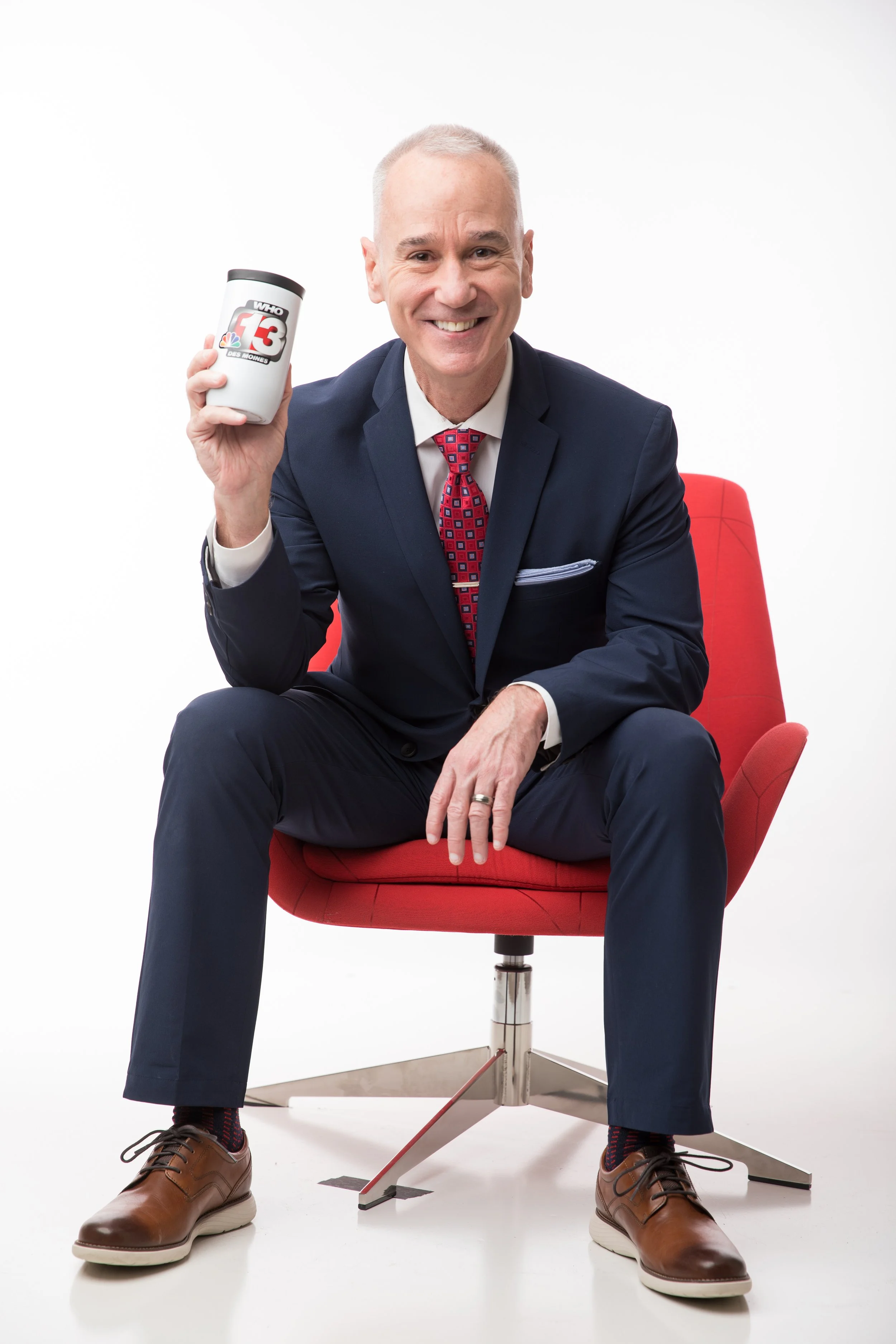WHO 13’s Keith Murphy Keeps it Civil In Rough-n-Tumble World of News, Sports, Politics
When I do word association for “authenticity,” I think Keith Murphy.
The WHO 13 sports director and co-host of the “Murph & Andy Show” on KXNO-Radio is talented and accomplished. He’s earned numerous awards, including Iowa Sportscaster of the Year and been voted by Cityview readers as Des Moines’ favorite sports commentator/columnist for more than two decades.
The guy who admits to drinking (and enjoying) a glass of half Diet Pepsi/half milk (he says it tastes like root beer) has the skills and tools (and then some) to be ranked among the best in his profession.
But observe Keith as a casual listener and viewer and you quickly appreciate him for so much more than pure talent. Most admirable is Keith’s likability and knack for bringing civility to every conversation. These are tremendous qualities in seemingly short supply these days, particularly in the rough-and-tumble, hyper-sensitive world of news, sports and politics.
What keeps the 25-year veteran of WHO 13 humble? What’s the best career advice he’s received? What should young professionals focus on? Keith offered his perspectives on these questions and others over a cup of coffee with me at Smokey Row in Des Moines.
The pandemic made you a news reporter – and a darn good one. Was that intentional?
It wasn’t a conscious choice or an epiphany. I just wanted to feel useful. Sports were shut down and I don’t have an important job to society in the ways that really matters, like first responders, nurses, police officers and people who really help when it’s all on the line.
As expected, it wasn’t long into the pandemic that I realized people were feeling down. Social media was trending negative, and a lot of people were having a difficult time. So, I asked folks to share some positives in their lives. Stories soon came pouring in: parents staying home and spending more time with their children, couples going on long walks together – this feedback quickly became a light for me.
Time spent dealing with the pandemic was also an opportunity to be creative. We never missed an evening WHO 13 sports cast. But our storytelling changed with positivity videos and tournaments we created out of thin air… like Iowa’s greatest sports moments, biggest gut punches and things like that. It helped get peoples minds off the heavy stuff.
You’re a mentor for so many. Who’s yours?
John Bachman. The former WHO 13 news anchor and colleague gave me the best advice in the business. He said, “Be home for dinner.” That’s short for “Don’t make life all about work.” Make time to sit around the table as a family, even if you’re busy and it has to be a quick bite. Check in and see how others are doing. It seems like a simple thing, but it’s not. Always make time for family.
What challenge strengthened you?
I attended college in Valdosta, GA, home to WVGA channel-44. The ABC affiliate was a small market station. One day I was told the station’s sports director (it was a one-person department) was leaving and I should go apply. I did and received an interview. I was so nervous and, not surprisingly, bombed the audition. On may way to the car, I was kicking myself because I knew I could’ve done better. Despite being even more shy than I am now, I went back in and asked for a do-over. I did and got the job.
Being a department of one, I had the opportunity to host my own show and work a crazy number of hours that you can while you’re young and don’t need to sleep. After two years, I was told they were transferring me to another station in Macon to work news. It didn’t even dawn on me that I could say no. Instead, I took the job and was soon in over my head. Yet, after two years of working news, it helped me realize that I wanted to be a sports reporter more than ever. The experience cemented my future in sports and taught me a lot in the process – like how to report on legal issues, contact courts and police and remember that people aren’t just names or numbers. In those two years of being in over my head, I had to learn through trial by fire.
The experience also reframed my approach to sports. I has always taken sports too seriously and would get crushed when my teams lost. But after covering news and homicides, it forever changed my perspective. Sports isn’t life or death. It’s an escape, an outlet of joy and something that’s to be fun. I recognize those people who think games are the biggest thing in life. They’re not. The job is serious, and the escape is serious; I just try not to take myself too serious.
How has sports changed?
It’s become a bit too much like politics. Society has become so monetized that we all exist in echo chambers. Most people say they want it (reporting) down the middle, yet they watch the cable station that says their opinion back to them.
The echo chamber example works for sports too. When a basketball or football game is on national TV, someone will inevitably talk about how anti Cyclone or Hawkeye the announcers are. But perhaps that opinion comes from listening to Gary Dolphin or John Walters, whose jobs aren’t to be objective but to call their respective games like a fan. When Rece Davis, Kirk Herbstreit or Brent Musburger are sharing their perspectives, you get a call they were for the other team. In a sense, politics is just like that. People want it reported a certain way and if it’s not, they get agitated.
How do we become more civil?
We need to talk face-to-face more, unplug more and walk in each other’s shoes more.
The biggest thing I try to do is realize that the person I’m conversing with is real and they feel the way they do for a reason. And offer more grace. We often forget to offer the benefit of the doubt to others. Instead, it’s about shouting someone else down, which is a result of not talking face to face like we used to. We go to the keyboard instead of meeting in person. But talking to one another can reduce the tension and defensiveness on both parts and turn a complex or controversial subject into a pleasant conservation.
And as simplistic as it is, we probably need to consider seeing others in the shoes they’re walking in. Too often, we’re constantly trying to win an argument, whether it be on Facebook Twitter or via text messaging. Everything is about winning instead of being better. We need to get to the place where the outcome is good for everyone.
What do you wish you could do more of?
Traveling, but not always for business. I think it’s something that I’ve been doing now that the kids are older, like taking in the Field of Dreams, Indy 500, Rose Bowl and Bowl Games. I’ve come to appreciate that there are things that don’t translate to the studio but help give you context, like getting a sense of the energy in the building, town, etc. you get that by being there.
Best stop on RV-TV?
The most electric visit during Cy-Hawk week is Albia. The fans are always charged up and excited. But the folks in Humboldt have the most fun. They’re always ready to party.
What sporting event would you most like to cover?
I’ve never been to a Super Bowl. However, I’ve also come to understand from those who have that you’ll be disappointed when you do. I’ve been to Augusta National but never reported from the Masters – would love to, though!
What is your advice to high school and college students?
Young people try to get good at everything rather than leaning into one thing and being the best at it. Don’t try to be all things to all people because you’ll never be. Everyone has gifts and is good at something. When you find that something, you’ll be successful. A wise person once said, “Don’t spend a lot of time developing your game going to your left if you’re right-handed. Spend time going to your right.”
When I met Andy Fales, I wanted to hire him because of his cover letter. His audition tape was solid but vanilla. But his cover letter was clever, and he could write. When he joined our team at WHO 13, I encouraged him to lean into his sarcastic humor and quirky perspectives because that’s what made him unique. When Chris (Hassel) left for ESPN, they wouldn’t let him be Hassel.
Focus on what’s uniquely you. It’s pointless to be another Keith Murphy or Andy Fales. What fingerprint can you put on a career, business, association, etc., that’s yours and yours alone. That journey starts with being the best version of yourself.
Aaron Putze is an author, public speaker and work-life coach. He can be reached at putzeink@gmail.com.




